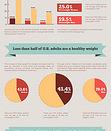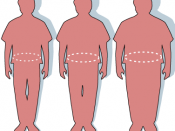�PAGE � �PAGE �1� [Author's Surname]
[Author's Name]
[Instructor's Name]
[Course Title]
[Date of Submission]
Argumentative Paper
Introduction
The prevalence of both overweight and obesity in the U.S has increased considerably over the last two decades, and studies reporting nationwide trends now abound in medical journals of all types, appearing in subspecialty as well as prominent cross-specialty journals. According to Hill et al. (p. 29), 54 percent of the United States population is overweight and even more alarming is that 31 percent are obese. Cristol (p. 10-12) reports that 26 percent of men and 28 percent of women are obese by age 36. Overweight and obesity prevalence among adolescents is 30.4 percent and 15.5 percent respectively (Ferraro & Kelly-Moore 111). The prevalence of persons in the United States with a body mass index greater than 30 (which is considered obese) has risen substantially in the last decade (Ferraro & Kelly-Moore 115).
In addition to health risks, obesity also has significant social and psychological consequences.
In a review of the stigma associated with being obese, Cahnman (1968) noted that although obesity was clearly a social phenomenon, it was" ... hardly ever mentioned in the writings of sociologists" (p. 283). More than 42 years later, obesity is still seldom discussed in the sociological literature, and has received almost no attention outside of research on stigma and prejudice. Most of the scholarship on obesity comes from the fields of medicine and public health. Thus, obesity is often placed entirely in the province of public health. While obesity is indeed a significant public health issue given its association with disease, disability, and even death, obesity is also a social problem with both social causation and consequences. For instance, there are large racial, ethnic, gender, socioeconomic, and age differences in obesity. Moreover, social inequality in...


